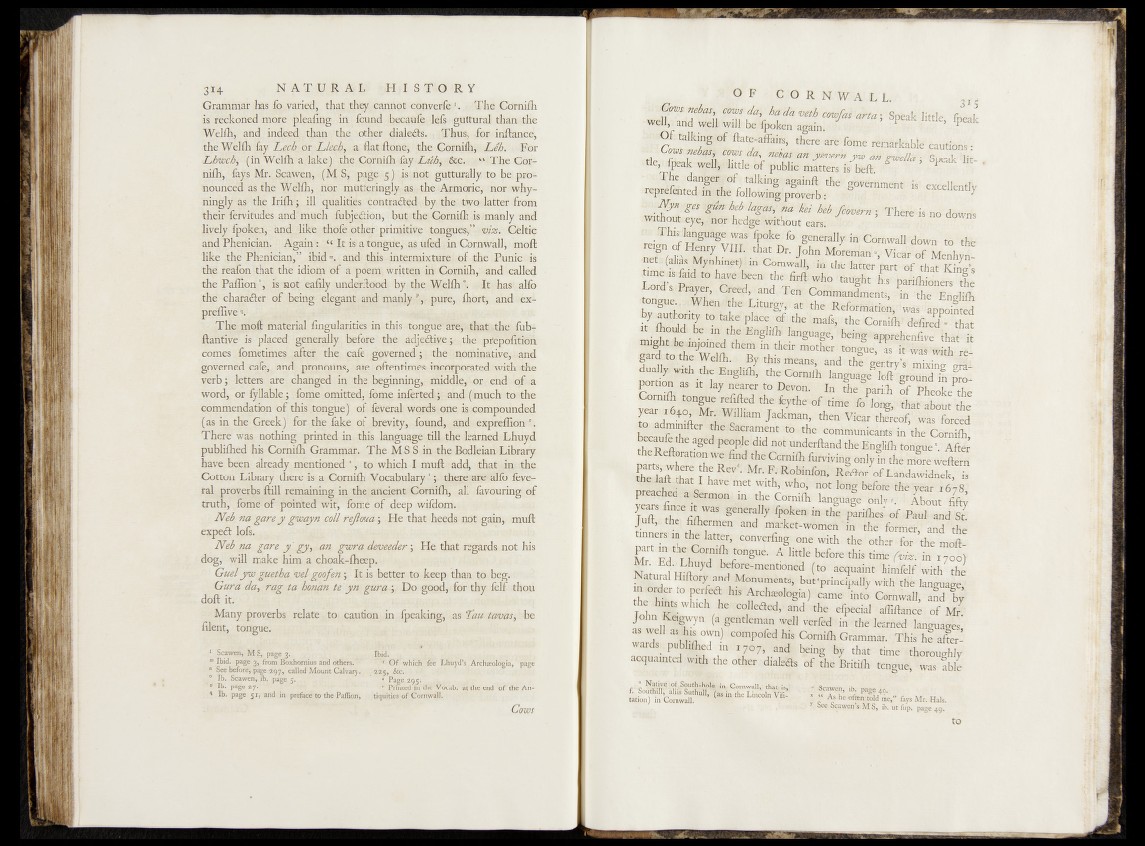
Grammar has fovaried, d$,t they, cannot converfe ' . GcïrniÉi
is reckoned more pleafing in - found becaufè lefs guttural than the
Welfh, and indeed than. th,e other a .Thus, for inftancé,
«the Welfh fay Lech^ or, Llec^ a flat ftpue, the Cornifh, JLeh. > For
Lbwch, '(in Welfh a lake) the Cornifh « f a y . “ «The Cornifh,
fays Mr.;§<:awen, (MS, page 5 )Us not gutturally to be;pronounced
as the Welfh, nor müt^eringly,:aS';the :A-rmoric, nor why-
fiingly as- the Irifh j ill qualities' contra<ft§<L by. the two latter from
their - fèrvitudes and'much fu^^donj-ibut-tbe. Cornifh is manly and
lively fpoken, and like thole other primitive topgpesj” Celtic
and Phenfician. ; Again*:. “ It is a tqngtie, as uftd.in Cornwall, moft
like .the Piienieian,” ibid ”, and this intermixture qf the | Punic «is
thé reafon that thé idioip df a poem. Cornifh, and'called
the Paflion“, is not eafily unddrflood; by, die Welfh It> hasJ alfo
the charatöer df being elegant and manlyiri»<pure,j fhdrt, and ex-
preflivé ‘»l*
The moft matérM fingularities iii this-.tpn^re*,lhej'»,thafc«,the fub-f
ftantive is placed, generally before the adjediye
comes ^ fometimes. ;after the cafe governed ; j the <}nominative,; and
governed cafe,, and pronouns, are oftentimes incorporated with.the
verb; letters are changed in the beginning, middle,-Q>r end qCa
word, or fy liable; .fbme omitted, fome infertedi; and (m.uch toSth©
commendation of this .tongue) of feveral words«one is^compounded
(as in the Greek)’ for the fake of brevity,« found,-jand? expreflion
There was nothing printed in this language tilLthe learned«. Lhuyd
publifhed his Cornifh Grammar. The M-SSin the Bodleian Library
have been already mentioned *, to which I muft.; add, thatUnr-the
Cotton Library there is a Cornifh Vocabulary r j there
ral proverbs ftill remaining in the ancient Corhifh, all .favouring of
truth, lomé o f pointed wit, KÖheöf deep wifdom;
Neb na gare y gwayn.coll rejioua-, He that heeds not gain, muft
expert lofs.
Neb na gare J k& b& jb gwr# deve$der j He that re^rds not his
dog, will make him a choak-fheep.
' Gael jw guetha.vel geofen •, It is better to keep than to beg.
Gura da^ rag ta honan te yn gura \ Do good, for thy -felf thou
doft it.
Many proverbs relate to. caution in fpeaking, as Tau tavas, -be
filent, tongue.
1 Scawen, M S, page 3.
m Ibid, page 3, from Boxhornius and others.
” See before, page 297’, called' Mount Calvary.
0 lb. Scawen, ib. page 5.
' ’ Ib. page 2 7 .''* l \
* Ib. page 51, and in preface to the Paffion,
Ibid. ,
■' O f which tee Lhuyd’s Archasologia, page
. 2 25 , See. I i
’ .Page.,295. ' .
1 Printed in the Vocab. at the end of the Antiquities
of Cornwall.
Cows
i É R l P K * * * cowfas arta; Speak little fneak
well,, and well will be fpoken again j 5 ® P i '’ lpeak
of S - af| S * « remfvkable caotioos -
tiP . f f S ™bavart"feverH yvb an gwella; Speak little,
n^eakwelljjfhttle of public matters & beft «l ’ "
“ the government is' excellently
reprefented in the following proverb' É jj f
without eye, nor hedge-withrou 't* ea rs; - S There iS no downS
nu| This^language was fpoke fo generally in Cornwall down to the
S r HM r7, V f f l--thatDr- J °hn M~ >
Liö thbMer part öf that Kine’s
S f p i 1" I P m ^ n ^ T h e
Jk . ^ Fisayer, C#eed,<and Tear Gonim&ndments, in -thé Enelifh
tongue.. When :the Liturgy, at the Refóïinatibn,dwas’1 abpoii^
by^utbonty to take; place ofuthelmafi, the CorniffiMdncS-.'that
langurfg^,' being' apprehenfive M ii
W i^ ém ^ io e d them: in -tha^othfera ^ % è ^ th rëgardoto(
t h e ,W ^ J y this Aeans, mixW J ï
dually with the.’Erigliflt,« ^CornMh l a n g a U ^ ^ ö ^ g l
porütfp as it lay nearer to Devon. In the >'arifh Z f Rheoke^tibe
Cornifh Ppngue refifted the; feythe of itim fodong, that about the
^ e n V i c a r t h L f i W r S r 5 3
to .admirer th e^ am en t to , thc conimuni<Uiits- in the Cornifh
th^R ft***" agedFe«P]edid not underftand thë Ënglifh tohgüè1. After
W Ê Ë v Ê m
£ 3 5 C T is
n r ^ d hi i , ^ metT lth’ Wh°> rt0t Io% fefoto tfie^ëar 1678,
preached ^Sermon m ^ C o rn ifh ï' langü^gê ^Öly v. ! A ^ u t f f i
f f d ^ ef i f h r a n d ^
i w h T u f - market-wbmeh fe the former,' and the
tinners in the latter, converfing. one with« the other for the moft-
C Ed U T t f tODgUe- A Jitde before this *7°o)
n L S hS Wth the
S ï ï Hiftory and Monuments, but »principally with the language^
Y W f ^ ^ Arclueolbgia) came into Cornwall, and by
t l n T 1C\ he CO ka£d} and the efPedal affiftance of Mr.
John Keigwyn (a gentleman well verfed in the learned languagès
as wefl as Ins own) compofed his Cornifh Grammar. This he afto-
wards publifhed m 1707, and being by that time thoroughly
acquainted with the other dialers of the Britifh tongue, was able
- c S°ut!>-höle- in Cornwall, that is,:
f. Southill.alias Suthull, (a3 in Lincoln ViK-'
ration J in Cornwall.
" Scawen, ib, page 49,
* “ As he often-told me,” fays Mr, Hals. f S®? SqawenVMS, ib. utfup, page 49.
to